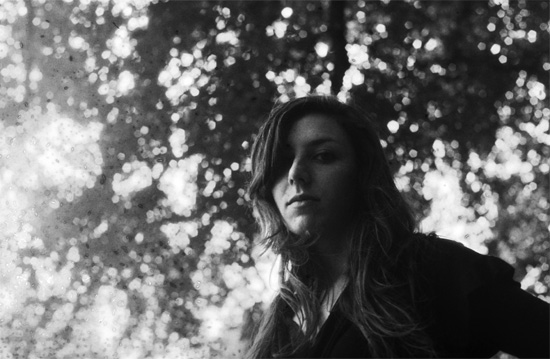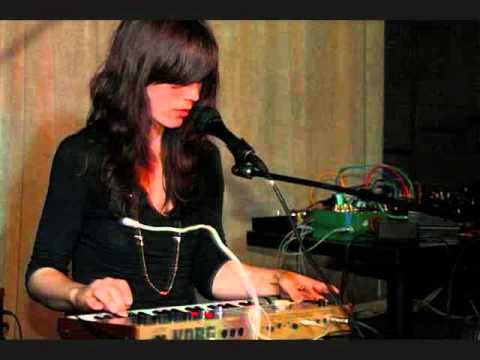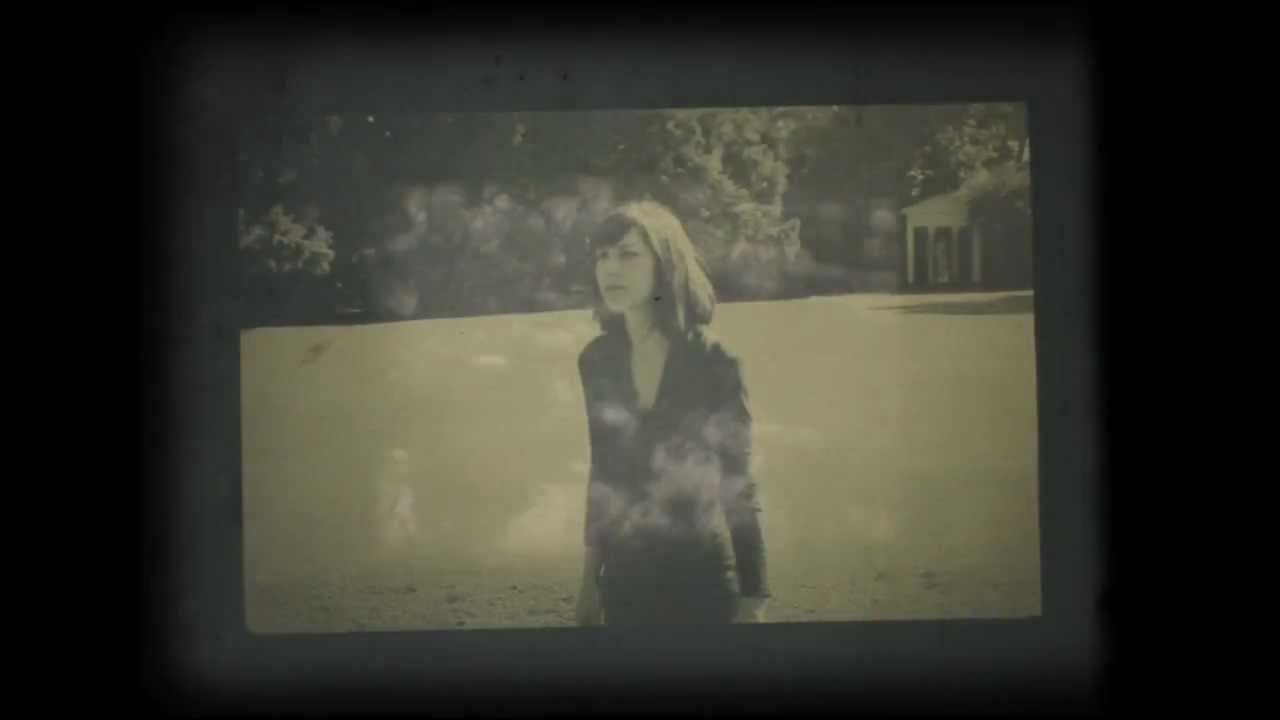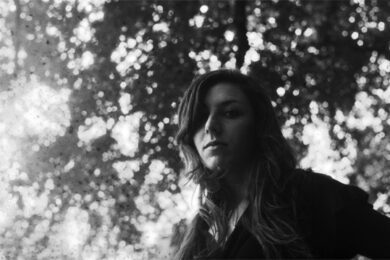Few have delved quite as far back into the past for inspiration as Julia Holter. Tragedy, her debut album, was loosely based upon Euripedes’ Hippolytus, a play some 2,440 years old. Upon its release last November, Holter gained a significant amount of attention, surprising not because it wasn’t merited (it most certainly was), but because her music is not easily consumed in parts. Hearing an odd snippet is not enough to grasp Tragedy – it requires a sustained one-sitting listen to fully appreciate. To devote any less would be like nipping out to the bar after the first act of a performance. But for those willing to dedicate the time it is a record that rewards concentration.
A few months on – earlier this year – Holter released a second album recorded in the same period as her debut, Ekstasis; named after an ancient Greek word meaning "to be or stand outside oneself, a removal to elsewhere". It is an appropriate definition, as Holter’s creations exists in a kind of elsewhere, suspended between the present and the distant past that they evoke.
These rather classical interests are, surprisingly, purely personal. Holter’s studies are more contemporary in nature, as a Cal Arts electronic music alumnus. One of her more notable previous projects involveed phonetic translations – covers of songs in a foreign language "translated" into English using phonetic sounds and vocal inflections. Another one of her earlier experiments, Cookbook, pre-empted her debut by following a John Cage score to adapt a cookery book into a musical composition.
Tragedy is just as ambitious, a mix of electronic and neo-classical instrumentals, interspersed with many layers of vocals, all painstakingly accomplished on rather crude audio editing software that must have been on the verge of crashing under the weight of it all. Holter’s vocals provide some minimal narration (based partly on the text and her own lyrics) to the myth, but the tragedy mostly unfolds through its blissful, chamber music arrangements that are threatened by the doom and dread of disquieting tape hiss and droning bass. Its laments are all the more potent spared from too much elucidation.
Although the material for Ekstasis was written along with Tragedy, the two are quite distinct. Whereas her debut is a continuous piece best experienced as a whole, Ekstasis is not bound together in a single narrative. Instead, there are a number of different scenarios: ‘In The Same Room’ is an experience of déjà vu in a chance meeting, ‘Four Gardens’ according to Holter, a plea "from a temptress". Most astounding about the album is its sheer depth of field. So much is happening at any one given moment, that the breadth of an individual song stretches far beyond its length. It is a complex record and yet many of its refrains stray more towards pop territory – ‘Marienbad’ and ‘Moni Mon Amie’ especially – something Holter is less than willing to concede.
When I call her for the interview she informs me that she is driving and I’m on speakerphone. As interviewer, I’m in the slightly odd position of being driven around LA and taken to the supermarket while she’s picking up some spinach for dinner. Bizarre as it might seem, the noise of surroundings audible through the phone during our conversation is reminiscent of the field recordings ever-present in the background of her songs. Interwoven at various points are the sounds of a radio tuning between channels, trains moving through the subway and hum of a room full of nattering people. If indeed the sounds of Holter’s immediate environment are, as she says, an invitation into another place, then this interview proves a peculiar visit to the space which her music inhabits.
Apart from classical training, I read that you studied with a guru whilst in India. Could you tell me a bit about your experience? And what kind of effect has it had on your music?
Julia Holter: Yeah. Only for a second, but yes. It was a beginner’s experience with Hindustani music, but was very intensive and inspiring. When I was in college one of my favorite professors, Steve Rush, took a handful of music students who had never studied Indian music to India. Each of us had a two-hour intensive lesson with a guru everyday for a month. I worked with an elder of the Mishras, Pashuspathi Nath Mishra, and also with his son, Kuber Mishra. It was a huge challenge – physically, really hard to sing so much, especially for someone like me who, at that time, rarely sang ever – and also just was special just to work with an acclaimed musician with whom I could barely communicate in language, but whose voice I could follow.
I don’t know if there are any obvious effects it had on my music, but one very concrete thing that happened on that trip is I came back to the US with a harmonium, and for the first time in my life, I had a portable instrument that I could play. This led to me exploring performance, for pretty much the first time in my life, aside from the horrible classical piano recitals as a kid. It also led to a lot more singing.
You’ve talked about doing various projects in the past, like your phonetic translations. I was wondering if could you tell me a bit more about one of your earlier releases, Cookbook?
JH: Cookbook is a performance of a John Cage piece called ‘Circus On’, in which he directs the performer to transcribe a text of her choice into sound. I chose a 1920s LA church club cookbook that I found on archive.org. I chose this because I knew it would call for sounds of the 1920s and, because it had a lot of ads with addresses on them, it would allow me to make field recordings of a neighborhood in Los Angeles. Here is how it works: my spoken part is actually a mesostic generated from the cookbook, which spans the course of the whole book. And so, as I speak, the things I am reading about – like ‘chopped carrots’ – come to life sonically – you may hear cutting. You also hear the sounds of the locations of these places, and ‘relevant sounds’. There is really so much left open in Cage’s score that, ultimately, the performer has a lot of freedom to play around.
It was so fun to do this but it was also a lot of work. I have notes from doing it it’s insane. First of all, pages and pages of the mesostic. And then pages of addresses in South Central Los Angeles that I went to and recorded with my minidisc recorder. I would sneak into furniture stores, markets, car washes, or wherever the address took me. People never gave me a hard time about it, probably because they didn’t know I was recording! I hope to always run around recording the public in secret. It is the best feeling.
What is that you’re trying to capture in those secret recording situations?
JH: Whatever environment that is around me, as opposed to a specific person or even a specific something at all. It’s not a focus on a specific subject, it’s like you’re asking a question almost, but instead of answering the question with ‘this is a person singing’ you’re responding with ‘this is what is happening right now’.
So you’re quite happy to have no control over anything when you’re recording?
JH: Yeah, because ultimately I will frame it. I’ll listen back to it and there will be things I’ll notice about it and that’ll emphasise. Even if you EQ something, you’re framing something.
So when you say environment, do you mean you’re trying to connect the music to a place? For example, in ‘So Lilies’ you use a clip of a train station.
JH: In that case I had already made a recording of the train station and I actually I just decided to put it in Tragedy. I didn’t think of it as, ‘Oh there’s going be a song with a train station clip’, I just thought it worked well, it was cinematic. That’s why I love field recordings. It uses the environment to create an atmosphere that I wouldn’t have been able to create myself.
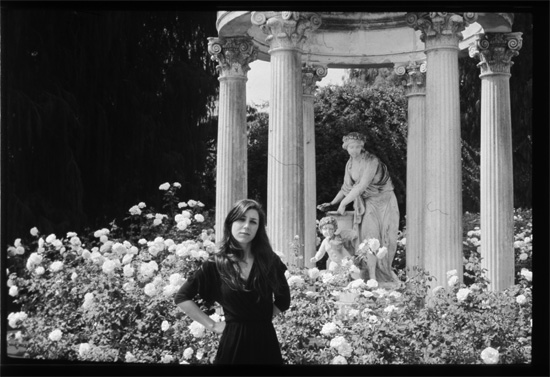
Did you take a similar approach to your mix for FACT? Although I assume that the field recordings are more about capturing the atmosphere of a city, Los Angeles, in this case?
JH: Well you see, they asked me to make a mix, and I didn’t know what to put in it because I haven’t been keeping up with new music. In fact, I haven’t listened to much music recently. I listen to music in the car on the way to work and oldies on the radio, or when I see friends playing. I didn’t know what else to put in besides what I know, so my response was to just put in the stuff that I hear everyday. Because I thought that was interesting – not because I am so interesting, or what I listen to would be so interesting to everyone else. Like you were saying, I thought it might be interesting for people who aren’t from LA to hear what was on the radio [laughs] and my friend’s interesting music. It relates a bit to my interest in documenting an environment.
Coming back to what you said about Tragedy being cinematic: a lot of your music seems to have a visual side to it. It often conjures up a scene or takes inspiration from images like film stills or illuminated manuscripts. So I was wondering whether the visual has a strong connection to music for you and whether you visualise your projects in a certain way?
JH: Yeah, Tragedy for sure, but not always. Ekstasis not so much because it was a bunch of different songs. But yeah, with Tragedy I had all these drawings I made before I started recording across my ceilings and walls, of the way that it was going be. So that’s definitely true in that case. In other cases, people might have a visual connection to the music that I didn’t intend, but I wanted Tragedy to be a sonic experience that was continuous and cinematic.
So those drawings were a visual plan of the record?
JH: Yeah I would take fragments of text – not all of it was from that exact play, some from other Greek tragedies – and I would draw these images in this particular way that I borrowed from Greek myth imagery in these children’s books and I would deconstruct the text a little bit on the page in a way that I liked which inspired me to record.
Is it a painstaking process put together the albums? With Ekstasis especially there seems to be so much going on at any one moment.
JH: Yeah, but not because of the form of the songs – more because I was doing it all myself. That was the main thing that was really hard. It affected the songwriting process: sometimes I’d change a song because of the way I was producing. For example in ‘Marienbad’ there were so many different ways I came up with to bridge its two parts, and it took me a month to make what eventually became that bridge. That was really hard.
But all of those things are production issues. I think it’s good I did it myself in some way, because it has a certain sound to it as a result of not being very well recorded. But I think that’s the reason why people should work with other people – in future I will work with an engineer. It’s hard for people to work with other people though, because there is no money in music, especially with recording, unless you have a record label – and many people don’t have a record label. The way that people make albums now is all on your own, so there are going to be these idiosyncrasies, and people are probably going to take longer to make them.
Do you ever get worried that things could get oversaturated or over complicated when making your songs so densely packed?
JH: If it did then I would pull things out. I like a lot of saturation in general, but sometimes it can be too much. Like the finale of Tragedy, where it’s all the voices of my friends, I thought that was too saturated. That would have been the second example I would have mentioned about what were discussing a second ago, in terms of painstaking horrible processes. That was really hard, when I was mixing that I was going crazy because there were so many voices, it never sounded right, even when I was done. But I was like, ‘You know what, that’s it’. But I ended up loving it ultimately, I was happy with it in time.
So yeah, I think there are times when I have that issue, and most of the time I get some perspective and stop working on it for a while, and then realise I was just being picky.
Some of tracks from your new album, ‘Marienbad’ for example, seem a bit more towards the pop side of your work. Is that something you were conscious of when writing Ekstasis?
JH: Well I wrote Ekstasis and Tragedy at the same time. I think the difference between them is with Tragedy, I let myself go and gave myself a lot of space with everything, because it was held together by a plot line and interactions between characters. With Ekstasis, just by the fact that the songs are not related, but are just each individually their own pieces of work, there will be a different feeling on that record. Each song will feel more contained, and I see why people think that equates with a pop feel – but it wasn’t intentional.
Also worth noting, while I worked on them at the same time, Ekstasis came and was finished later than Tragedy, and all of Ekstasis was recorded on Logic, while some of Tragedy was recorded on Audacity, a much cruder and more difficult audio software to work with. And of course we had my friend Cole M. Greif-Neill [Ariel Pink co-producer and guitarist] mix the record beautifully, so that might explain some of the better fidelity or accessibility.
I know we’ve talked a lot about production, so I wanted to ask you a bit about the lyrics on both albums. There are so many lines that have this mesmeric quality to them. How do you come up with phrases like that?
JH: Well it depends, with ‘Four Gardens’ I wrote that song like four or three years ago, and I wrote it while practicing for a show and I just started singing the lines. Sometimes it just comes out like that. With ‘Boy in the Moon’ too, the words just came out of my mouth and then I kept them because I liked them. In other cases it takes me a long time to write.
I just sort of get sucked into this world of a song and I don’t necessarily understand why the lyrics are what they are until after. At the time it’s just coming out and the syntax doesn’t always make sense, but I think that’s how my brain works. I don’t know how else you’d actually write a song. I just put myself in a mode when I’m in that character and trying to say something to someone else. With ‘Boy in the Moon’, I don’t know why that one was so weird, it was a surreal experience, I was just letting this imagery pass through my head. It was like improvising or freestyling or something.
Have you started working on anything new?
JH: I’ve been recording for a year, because I finished those two records a year ago. So I’ve been recording for a long time, I have a lot of new songs.
Are they part of an album?
JH: I think they are, maybe from different albums, maybe three different albums. I don’t mean I have three full albums finished – just that they’d be for different projects.
So do you always work on a lot of projects at once?
JH: I don’t know if that’s always how I work. I guess in the past I was focused on one piece at a time, but I think it suits me better to work on different things. When I say that I work on stuff that would fit on three different projects, I’ve been recording a lot and different things come up at different times. So I basically write when I want to write, I don’t force myself to fit things. If I start writing a song that does fit, I don’t stop writing it; I just say it’s a different project. I’m very adamant about only doing things when I want to do them.
Julia Holter plays live at Field Day, in London’s Victoria Park on June 2nd
Photos by Rick Bahto

